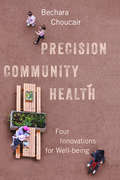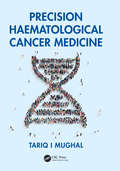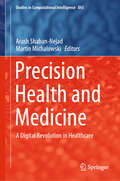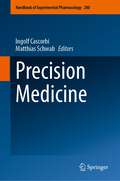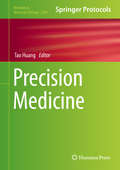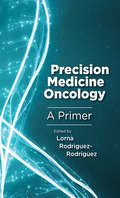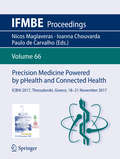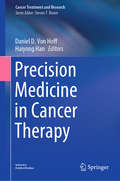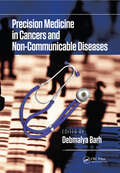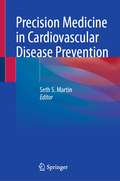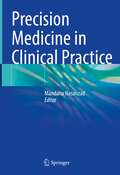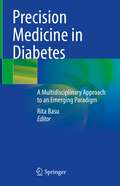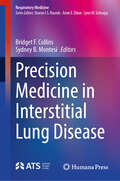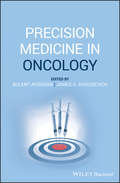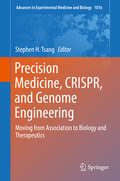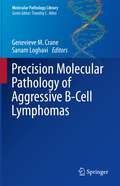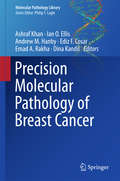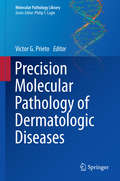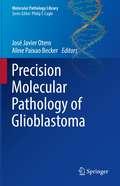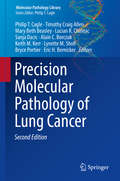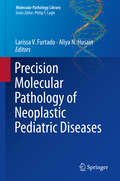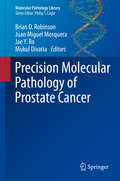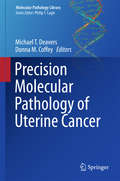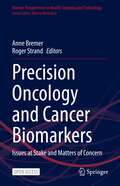- Table View
- List View
Precision Community Health: Four Innovations for Well-being
by Bechara ChoucairWhen Bechara Choucair was a young doctor, he learned an important lesson: treating a patient for hypothermia does little good if she has to spend the next night out in the freezing cold. As health commissioner of Chicago, he was determined to address the societal causes of disease and focus the city's resources on its most vulnerable populations. That targeted approach has led to dramatic successes, such as lowering rates of smoking, teen pregnancy, breast cancer mortalities, and other serious ills.In Precision Community Health, Choucair shows how those successes can be replicated and expanded around the country. The key is to use advanced technologies to identify which populations are most at risk for specific health threats and avert crises before they begin. Big data makes precision community health possible. But in our increasingly complex world, we also need new strategies for developing effective coalitions, media campaigns, and policies. This book showcases four innovations that move public health departments away from simply dispensing medical care and toward supporting communities to achieve true well-being.The approach Choucair pioneered in Chicago requires broadening our thinking about what constitutes public health. It is not simply about access to a doctor, but access to decent housing, jobs, parks, food, and social support. It also means acknowledging that a one-size-fits-all strategy may exacerbate inequities. By focusing on those most in need, we create an agenda that is simultaneously more impactful and more achievable. The result is a wholesale change in the way public health is practiced and in the well-being of all our communities.
Precision Haematological Cancer Medicine
by Tariq MughalMany experts now consider genetic evaluation to be pivotal for the optimal diagnosis, classification, risk stratification, and therapeutic decision-making for persons diagnosed with blood cancer. This new text specifically focuses on the genetic alterations essential for establishing diagnosis and assesses how they might impact the precision oncology standard of care. Providing an authoritative review of the state of the art, this is essential reading for physicians, hematologists, and oncologists for optimal management of individual patients.
Precision Health and Medicine: A Digital Revolution in Healthcare (Studies in Computational Intelligence #843)
by Arash Shaban-Nejad Martin MichalowskiThis book highlights the latest advances in the application of artificial intelligence to healthcare and medicine. It gathers selected papers presented at the 2019 Health Intelligence workshop, which was jointly held with the Association for the Advancement of Artificial Intelligence (AAAI) annual conference, and presents an overview of the central issues, challenges, and potential opportunities in the field, along with new research results. By addressing a wide range of practical applications, the book makes the emerging topics of digital health and precision medicine accessible to a broad readership. Further, it offers an essential source of information for scientists, researchers, students, industry professionals, national and international public health agencies, and NGOs interested in the theory and practice of digital and precision medicine and health, with an emphasis on risk factors in connection with disease prevention, diagnosis, and intervention.
Precision Medicine (Handbook of Experimental Pharmacology #280)
by Matthias Schwab Ingolf CascorbiThe rapidly increased understanding of the molecular background of complex diseases facilitated the development of highly advanced therapeutic concepts. Such concepts aiming to consider individual signatures of genomic and proteomic biomarkers including pharmacogenomics as well as advanced diagnostic tools have been successfully implemented in clinical practice in various fields leading to significant improvement of treatment successes. This volume gives an up-to-date overview on applications of precision medicine in various clinical entities, on advanced techniques as well as on economic considerations.
Precision Medicine (Methods in Molecular Biology #2204)
by Tao HuangThis book serves to introduce the technologies and applications of precision medicine. Beginning with a section on emerging experimental and bioinformatics technologies, the collection continues with chapters covering cancer studies, cardiovascular diseases, COPD and systemic lupus erythematosus, as well as the latest engineering and surgical developments in precision medicine. As a volume in the highly successful Methods in Molecular Biology series, this book presents key information from experts in the field. Authoritative and cutting-edge, Precision Medicine covers perspectives of precision medicine from basic research to clinical surgeries, from cancer to cardiovascular disease, from sequencing technology to big data analysis in the hope of broadening the horizons for researchers, engineers, and clinicians and accelerating the interdisciplinary precision medicine research and applications.
Precision Medicine Oncology: A Primer
by Shridar Ganasen Lorna Rodriguez-Rodriguez Kim M. Hirshfield Hossein Khiabanian Gregory RiedlingerPrecision medicine is rapidly becoming the standard-of-care for the treatment of cancer patients. This is made possible, in part, by the ready availability and reasonable costs of comprehensive DNA and RNA sequencing assays. However, precision medicine is complex and incorporates entirely new types of data and treatment paradigms that are outside of the training of most oncologists in practice today. Precision Medicine Oncology: A Primer is a concise review of the fundamental principles and applications of precision medicine, intended for clinicians, particularly those working in oncology. It provides an accessible introduction to the technological advances in DNA and RNA sequencing, gives a detailed overview of approaches to the interpretation of molecular test results and their point-of-care implementation for individual patients, and describes innovative clinical trial designs in oncology as well as characteristics of the computational infrastructures through which massive quantities of data are collected, stored, and used in precision medicine oncology.
Precision Medicine Powered by pHealth and Connected Health: ICBHI 2017, Thessaloniki, Greece, 18-21 November 2017 (IFMBE Proceedings #66)
by Nicos Maglaveras Ioanna Chouvarda Paulo De CarvalhoThis volume presents the proceedings of the 3rd ICBHI which took place in Thessaloniki on 18-21 November, 2017.The area of biomedical and health informatics is exploding at all scales. The developments in the areas of medical devices, eHealth and personalized health as enabling factors for the evolution of precision medicine are quickly developing and demand the development of new scaling tools, integration frameworks and methodologies.
Precision Medicine in Cancer Therapy (Cancer Treatment and Research #178)
by Haiyong Han Daniel D. Von HoffThis book presents the latest advances in precision medicine in some of the most common cancer types, including hematological, lung and breast malignancies. It also discusses emerging technologies that are making a significant impact on precision medicine in cancer therapy. In addition to describing specific approaches that have already entered clinical practice, the book explores new concepts and tools that are being developed.Precision medicine aims to deliver personalized healthcare tailored to a patient’s genetics, lifestyle and environment, and cancer therapy is one of the areas in which it has flourished in recent years. Documenting the latest advances, this book is of interest to physicians and clinical fellows in the front line of the war on cancer, as well as to basic scientists working in the fields of cancer biology, drug development, biomarker discovery, and biomedical engineering. The contributing authors include translational physicians with first-hand experience in precision patient care.
Precision Medicine in Cancers and Non-Communicable Diseases
by Debmalya BarhThe availability of human genome, large amount of data on individual genetic variations, environmental interactions, influence of lifestyle, and cutting-edge tools and technologies for big-data analysis have led to the era of clinical practice of "Precision Medicine". This book aims to provide a readily available resource on all the important developments achieved so far in the field of oncology. All recent developments have been explained along with epidemiology, technologies and approaches to manage the included diseases. Therefore, readers will get the up to date information on the next-generation approach in tackling all kinds of cancer. Key Features • Presents the latest trend of cancer management based on precision/predictive medicine approach • Reviews the latest and up to date literature in the field of Precision Medicine • Highlights the next generation approach in tackling malignant diseases • Discusses how a life-threatening disease like cancer can be managed with the help of Precision Medicine • Encapsulates a global prospective
Precision Medicine in Cardiovascular Disease Prevention
by Seth S. MartinThis book contains the current knowledge and potential future developments of precision medicine techniques including artificial intelligence, big data, mobile health, digital health and genetic medicine in the prevention of cardiovascular disease. It reviews the presently used advanced precision medicine techniques and fundamental principles that continue to act as guiding forces for many medical professionals in applying precision and preventative medical techniques in their day-to-day practices. Precision Medicine in Cardiovascular Disease Prevention describes current knowledge and potential future developments in this rapidly expanding field. It therefore provides a valuable resource for all practicing and trainee cardiologists looking to develop their knowledge and integrate precision medicine techniques into their practices.
Precision Medicine in Clinical Practice
by Mandana HasanzadThe book provides complete information on the cornerstones of precision medicine through the omics approach. Clinical applications of genomics and precision medicine have progressed from a theoretical wish list to an impactful force in medical practice.Step-by-step descriptions are provided from basics to the future application and its benefit in clinical practice. Precision medicine aims to personalize health care by tailoring decisions and treatments to each individual in every possible way. Precision medicine includes pharmacogenomics. Essential information is provided on the role of precision medicine and pharmacogenomics in the clinical practice of cancer, cardiovascular disease, diabetes, psychiatric disease, and also the importance for healthcare professionals. This book will assist the practitioners how to integrate precision medicine and pharmacogenomics data into their clinical practice. It is hoped that physicians, pharmacists, and scientists with basic scientific knowledge of precision medicine will findthis book useful.
Precision Medicine in Diabetes: A Multidisciplinary Approach to an Emerging Paradigm
by Rita BasuBringing clarity to the emerging model of precision medicine within the diabetes field, and expanding upon how it will lead to the development of specifically tailored treatment for patients and even macro strategies in public health, this unique book explores the realm of biomarkers in the era of big data. Various experts in their respective areas discuss the current practice to illuminate how creating a more discreet profile of patients and even substratum of populations will lead to more refined therapies targeted towards the phenotype and genotype of the patient.Embracing a multidisciplinary team science approach, this book demonstrates how precision medicine in diabetes can mine a web of data toward diabetes risk stratification and treatment options. The authors skillfully articulate how the construction of various prediction-based models can revolutionize clinical decision-making, and they examine the challenges and pitfalls of integrating disparate sources of information and how the collection of data and cooperation among stakeholders will be key to the future of precision medicine in diabetes treatment. Topics include personalized approaches to the management of both type 1 and type 2 diabetes, various macro and microvascular complications of diabetes, inpatient management of glycemia, nutrition, exercise, advances in diabetes technology and others.Ideal for clinical endocrinologists and other professionals involved in the management of diabetes and its complications, Precision Medicine in Diabetes is first of its kind to address this paradigm-shifting topic in a comprehensive way.
Precision Medicine in Interstitial Lung Disease (Respiratory Medicine)
by Bridget F. Collins Sydney B. MontesiThis book provides a state-of-the-art update on precision medicine in Interstitial Lung Diseases (ILD). This is a rapidly evolving and growing field. There have been multiple recent manuscripts and reviews on this topic although each of these only includes certain aspects of precision medicine in ILD, broken down in different ways. It is thus the aim of this book to aggregate this information into a single volume. The first chapter broadly defines precision medicine. This introduces and defines various areas of precision medicine to set the reader up for understanding what is discussed at a higher level for the remainder of the book. The chapter ends with a glossary of relevant terms for quick reference while readers work through the remainder of the book. The second chapter highlights successes and obstacles in using and implementing precision medicine in other lung diseases such as cystic fibrosis and lung cancer. The next section focuses on how information that is currently available can be thought of as contributing to precision medicine. For instance, how a provider might think of and weigh peripheral monocytosis on a CBC, how race and ethnicity might influence diagnosis and prognosis, and how environmental influences such as air pollution or occupational exposures may interact with genetics leading to increased risk for disease and/or poor outcomes in ILD. One chapter in this section discusses using precision medicine for screening family members for ILD and how knowing results of a patient&’s family member&’s testing or their clinical course may or may not be useful. Additionally, authors explore how technology is contributing to and influencing ILD diagnosis and treatment. This includes machine learning and AI, particularly in radiology, big data, and more specific patient reported outcomes gathered via apps and devices. Finally, expert authors highlight the importance of considering economics and equity in precision medicine as some of the above approaches are at this point quite costly to develop and employ and look to what future developments and research are on the horizon. This is an ideal guide for practicing pulmonary and critical care physicians, those with expertise in interstitial lung diseases as well as general pulmonologists.
Precision Medicine in Oncology
by James A. Radosevich Bulent AydoganA FRESH EXAMINATION OF PRECISION MEDICINE'S INCREASINGLY PROMINENT ROLE IN THE FIELD OF ONCOLOGY Precision medicine takes into account each patient's specific characteristics and requirements to arrive at treatment plans that are optimized towards the best possible outcome. As the field of oncology continues to advance, this tailored approach is becoming more and more prevalent, channelling data on genomics, proteomics, metabolomics and other areas into new and innovative methods of practice. Precision Medicine in Oncology draws together the essential research driving the field forward, providing oncology clinicians and trainees alike with an illuminating overview of the technology and thinking behind the breakthroughs currently being made. Topics covered include: Biologically-guided radiation therapy Informatics for precision medicine Molecular imaging Biomarkers for treatment assessment Big data Nanoplatforms Casting a spotlight on this emerging knowledge base and its impact upon the management of tumors, Precision Medicine in Oncology opens up new possibilities and ways of working – not only for oncologists, but also for molecular biologists, radiologists, medical geneticists, and others.
Precision Medicine in Stroke
by José M. Ferro Ana Catarina FonsecaThis book provides a comprehensive coverage of the state of the art in precision medicine in stroke. It starts by explaining and giving general information about precision medicine. Current applications in different strokes types (ischemic, haemorrhagic) are presented from diagnosis to treatment. In addition, ongoing research in the field (early stroke diagnosis and estimation of prognosis) is extensively discussed. The final part provides an in-depth discussion of how different interdisciplinary areas like artificial intelligence, molecular biology and genetics are contributing to this area.Precision Medicine in Stroke provides a practical approach to each chapter, reinforcing clinical applications and presenting clinical cases. This book is intended for all clinicians that interact with stroke patients (neurologists, internal medicine doctors, general practitioners, neurosurgeons), students and basic researchers.
Precision Medicine, CRISPR, and Genome Engineering
by Stephen H. TsangThis book presents descriptive overviews of gene editing strategies across multiple species while also offering in-depth insight on complex cases of application in the field of tissue engineering and regenerative medicine. Chapters feature contributions from leaders in stem cell therapy and biology, providing a comprehensive view of the application of gene therapy in numerous fields with an emphasis on ophthalmology, stem cells, and agriculture. The book also highlights recent major technological advances, including ZFN, TALEN, and CRISPR. Precision Medicine, CRISPR, and Genome Engineering is part of the highly successful Advances in Experimental Medicine and Biology series. It is an indispensable resource for researchers and students in genetics as well as clinicians.
Precision Molecular Pathology of Aggressive B-Cell Lymphomas (Molecular Pathology Library)
by Genevieve M. Crane Sanam LoghaviWritten by experts in the field, Precision Molecular Pathology of Aggressive B-Cell Lymphomas contains the most recent revisions from the 5th Edition WHO and 2022 International Consensus Classification diagnostic categories and serves as an important resource for trainees, pathologists, haematologist/oncologists, other clinicians involved in lymphoma care and lymphoma researchers. It provides a comprehensive yet concise synthesis of emerging molecular advances that inform patient care and improve understanding of disease mechanisms. In addition, it provides the necessary background to how molecular techniques are performed to enable the reader to better interpret and critically evaluate relevant and emerging data. As part of the Molecular Pathology Library series, this book focuses specifically on aggressive B-cell lymphomas given the increasing relevance of molecular data for diagnosis and treatment of these disorders. This evidence-based text contains 25 chapters and is divided into 5 parts. Part 1 provides a brief history and background of aggressive B-cell lymphomas. Landmark events in their classification and treatment are given in order to place the substantial advances in the field in context. Part 2 reviews molecular pathology methods, including the increasing use of next generation sequencing techniques in clinical practice. Parts 3 and 4 focus on individual subtypes of aggressive B-cell lymphoma, including a summary of the diagnostic criteria and key pathologic and clinical features for each entity. Finally, Part 5 focuses on emerging molecular technologies that may significantly impact clinical practice.
Precision Molecular Pathology of Breast Cancer
by Ashraf Khan Ian O. Ellis Andrew M. Hanby Ediz F. Cosar Emad A. Rakha Dina KandilThis volume provides a comprehensive review of the molecular mechanisms involved in precancerous lesions and benign and malignant breast tumors. Given the complex molecular pathways in breast cancer biology, the book simplifies these complex mechanisms and highlights the practical issues important for daily practice. Sections are structured to review breast carcinogenesis and the role of familial predisposition and stem cells in initiation and progression of breast cancer. In-depth chapters present morphologic and molecular correlations in precancerous and malignant breast lesions, while outlining highly practical issues that are in practice today in breast pathology, such as evaluation of estrogen, progesterone receptors, and HER-2. Written by experts in the field, Precision Molecular Pathology of Breast Cancer is a valuable resource that covers the current practice of breast pathology and looks into the future with an emphasis on the molecular basis of breast cancer.
Precision Molecular Pathology of Dermatologic Diseases
by Victor G. PrietoThis volume is a concise yet comprehensive resource for physicians dealing with, and interested in, the field of molecular pathology in dermatopathology. The book includes descriptions of the techniques and their application to cutaneous diseases and describes possible future techniques and their use in dermatopathology. Special emphasis is also given to the practical application of these techniques to particular situations illustrated by demonstrative cases. Written by experts in their fields, Precision Molecular Pathology of Dermatologic Diseases is of great value to pathologists, dermatologists, resident and fellows, internists, and general practitioners who deal with dermatologic diseases.
Precision Molecular Pathology of Glioblastoma (Molecular Pathology Library)
by José Javier Otero Aline Paixao BeckerThis volume provides a balanced and realistic review of the current state of glioblastoma, ranging from traditional histological review, molecular pathology of glioma, modern radiomics, neurosurgical focus, and integration of treatment plans by neuro-oncologists. The book reviews basic principles such as epidemiology and etiology, and modern 2016 WHO classification of CNS tumors. Chapters cover a general overview of common molecular techniques used in molecular pathology, molecular pathology in a developing country, key drivers of patient outcomes and predictors of response to radiation and/or chemotherapy treatment, and immunohistochemical surrogates for key molecular pathology. It concludes with reviews on radiomics, animal and stem cell models of glioblastoma, and a chapter on the emerging field of Glioblastoma Neuroscience. Precision Molecular Pathology of Glioblastoma is intended for pathology residents and fellows interested in glioblastoma, general surgical pathologists who need reviews on how to implement modern glioblastoma classification, as well as neuro-radiologists, oncologists, and radiation oncologists needing a holistic perspective to glioblastoma diagnosis and management.
Precision Molecular Pathology of Lung Cancer
by Philip T. Cagle Timothy Craig Allen Mary Beth Beasley Alain C. Borczuk Lucian R. Chirieac Keith M. Kerr Sanja Dacic Lynette M. Sholl Bryce Portier Eric H. BernickerThis new edition provides the latest information and insights into the molecular basis for lung cancer. Since the publication of the previous edition of this volume, dramatic changes have occurred with the classification of lung cancer, biomarker testing, and molecular therapy. The book covers these changes, providing updates and new insights on the background of lung cancer, testing methods, and the molecular pathology of specific cell types, including adenocarcinoma, squamous cell carcinoma, small cell carcinoma, and precursor and preinvasive lesions. Authored by experts in the field, Precision Molecular Pathology of Lung Cancer, Second Edition remains one of the few books that comprehensively covers the new molecular pathology of lung cancer and is a valuable resource for pathologists, medical oncologists, radiation oncologists, thoracic surgeons, and thoracic radiologists.
Precision Molecular Pathology of Neoplastic Pediatric Diseases (Molecular Pathology Library)
by Larissa V. Furtado Aliya N. HusainThis book provides a comprehensive, state-of-the art review of pediatric oncology. The text covers relevant concepts in molecular biology and addresses technical principles, applications, challenges, and integration of current and emerging genomic and molecular methods in the diagnosis and personalized management of childhood cancers. The text also discusses a wide array of pediatric neoplasms in the context of molecular pathology in a concise and understandable manner, with focus on their molecular pathogenesis, clinicopathological features, classification, molecular diagnosis, and approaches to personalized care.Written by experts in the field, Precision Molecular Pathology of Neoplastic Pediatric Diseases serves as a valuable resource for pathologists, pediatric oncologists, trainees and researchers with an interest in pediatric and molecular pathology.
Precision Molecular Pathology of Prostate Cancer
by Jae Y. Ro Brian D. Robinson Juan Miguel Mosquera Mukul DivatiaThis volume focuses on our current understanding of the molecular underpinnings of prostate cancer and their potential application for precision medicine approaches. The emergence and applications of new technologies has allowed for a rapid expansion of our understanding of the molecular basis of prostate cancer and has revealed a remarkable genetic heterogeneity that may underlie the clinically variable behavior of the disease. The book consists of five sections which provide insight about the following: (1) General principles; (2) Molecular signatures of primary prostate cancer; (3) Molecular signatures of advanced prostate cancer; (4) Key molecular pathways in prostate cancer development and progression; (5) and Precision medicine approach: Diagnosis, treatment, prognosis. Precision Molecular Pathology of Prostate Cancer is an important resource for the practicing oncologist, urologist, and pathologist, and will also be useful for researchers in the prostate cancer community.
Precision Molecular Pathology of Uterine Cancer
by Donna M. Coffey Michael T. DeaversThis text provides a comprehensive review for practicing pathologists to understand the molecular biology, diagnostics, and predictive markers and implications for therapy of uterine cancer. While molecular based therapeutic strategies for uterine cancer are not as well developed as for some other organ sites, these are the most common gynecologic malignancies and there have been many important recent developments that are discussed in this volume. Comprehensive chapters address essential information about endometrial carcinoma, uterine mesenchymal tumors, and cervical carcinoma and include the pathogenesis of carcinoma and discuss molecular based classification, biomarkers, therapy, prevention, and hereditary cancers of the uterus. Precision Molecular Pathology of Uterine Cancer is a unique and one of a kind resource for practicing pathologists, pathologists in training and gynecologists.
Precision Oncology and Cancer Biomarkers: Issues at Stake and Matters of Concern (Human Perspectives in Health Sciences and Technology #5)
by Roger Strand Anne BremerThis open access book reflects on matters of social and ethical concern raised in the daily practices of those working in and around precision oncology. Each chapter addresses the experiences, concerns and issues at stake for people who work in settings where precision oncology is practiced, enacted, imagined or discussed. It subsequently discusses and analyses bioethical dilemmas, scientific challenges and economic trade-offs, the need for new policies, further technological innovation, social work, as well as phenomenological research. This volume takes a broad actor-centred perspective as, whenever cancer is present, the range of actors with issues at stake appears almost unlimited. This perspective and approach opens up the possibility for further in-depth and diverse questions, posed by the actors themselves, such as: How are cancer researchers navigating biological uncertainties? How do clinicians and policy-makers address ethical dilemmas around prioritisation of care? What are the patients’ experiences with, and hopes for, precision oncology? How do policy-makers and entrepreneurs envisage precision oncology? These questions are of great interest to a broad audience, including cancer researchers, oncologists, policy-makers, medical ethicists and philosophers, social scientists, patients and health economists.
